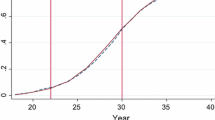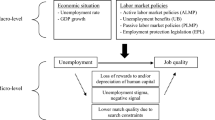Abstract
In this paper, we study the non-financial employment commitment using the so-called “lottery question”, which asks if you would continue working if you won the lottery. This is the first study that reports results using data from a Southern-European country and this is done both before and 3 years into the recession following the financial crisis of 2008. We find that the willingness to continue working in Spain is shockingly lower than in previous research done in other countries. Additionally, we find two important moderators of the non-financial employment commitment at the individual level. The willingness to work increases by education level and it is negatively correlated with the time spent searching for jobs. We find some regional effects, but in general, we do not find that the non-financial employment commitment is higher during the financial recession.

Similar content being viewed by others
Notes
A recent paper might provide an explanation about why, in general, worse economic conditions lead to higher employment commitment. Başlevent and Kirmanoğlu (2014) show that job insecurity increases life satisfaction associated with having any job, even a less-desired job.
We also tried including two other job-related variables: contract type and firm size, but neither of the variables were statistically significant at the 5% significance level in both years, so we decided not to include them in the model.
References
Bancaja Foundation and Ivie (The Valencian Institute of Economic Research). (2008). Observatorio de Inserción Laboral de los Jóvenes [Observatory of young people’s transition to the labour market] [Data file]. Retrieved from http://www.ivie.es/en/banco/insercion/insercion.php.
Bancaja Foundation and Ivie (The Valencian Institute of Economic Research). (2011). Observatorio de Inserción Laboral de los Jóvenes [Observatory of young people’s transition to the labour market] [Data file]. Retrieved from http://www.ivie.es/en/banco/insercion/insercion.php.
Başlevent, C., & Kirmanoğlu, H. (2014). The impact of deviations from desired hours of work on the life satisfaction of employees. Social Indicators Research, 118(1), 33–43.
Campbell, A., Converse, P., & Rodgers, W. (1976). The quality of American life: Perceptions, evaluations, and satisfactions. New York, NY: Russell Sage Foundation.
Catalan protesters rally for greater autonomy in Spain. (2010, July 10). Retrieved from http://www.bbc.com/news/10588494. Accessed November 4, 2015.
D’Agostino, A., & Regoli, A. (2013). Life conditions and opportunities of young adults: Evidence from Italy in European comparative perspective. Social Indicators Research, 113(3), 1205–1235.
Dunn, A. (2011). Only fools? Reconsidering the relationship between commitment to the work ethic and education attainment. Journal of Education and Work, 26(1), 1–20.
Dunn, A., Grasso, M. T., & Saunders, C. (2014). Unemployment and attitudes to work: Asking the ‘right’ question. Work, Employment and Society, 28(6), 904–925.
Furnham, A. (1982). The Protestant work ethic and attitudes towards unemployment. Journal of Occupational Psychology, 55(4), 277–285.
Harpaz, I. (2002). Expressing a wish to continue or stop working as related to the meaning of work. European Journal of Work and Organizational Psychology, 11(2), 177–198.
Highhouse, S., Zickar, M., & Yankelevich, M. (2010). Would you work if you won the lottery? Tracking changes in the American work ethic. Journal of Applied Psychology, 95(2), 349–357.
Instituto Nacional de Estadística (INE). (2015). Renta por persona y unidad consumo por comunidades autónomas. [Income per capita and unit consumption by autonomous regions]. Instituto Nacional de Estadística. Retrieved from http://www.ine.es/jaxiT3/Tabla.htm?t=9947. Accessed June 23, 2016.
Instituto Nacional de Estadística (INE). (2016). Tasas de paro por distintos grupos de edad, sexo y comunidad autónoma. [Unemployment rates by age, sex and autonomous regions]. Instituto Nacional de Estadística. Retrieved from http://www.ine.es/jaxiT3/Tabla.htm?t=4247. Accessed June 23, 2016.
International Labour Organization. (2014, March 23). Labour Statistics database. Retrieved from http://laborsta.ilo.org/. Accessed June 23, 2016.
Kaplan, H. R., & Tausky, C. (1974). The meaning of work among the hard-core unemployed. Pacific Sociological Review, 16(2), 185–198.
Long, S. (1997). Regression models for categorical and limited dependent variables. Thousand Oaks, CA: Sage Publications Inc.
Lyman, E. (1955). Occupational differences in the value attached to work. American Journal of Sociology, 61(2), 138–144.
Mirels, H. L., & Garrett, J. B. (1971). The Protestant ethic as a personality variable. Journal of Consulting and Clinical Psychology, 36(1), 40.
Morse, N. C., & Weiss, R. S. (1955). The function and meaning of work and the job. American Sociological Review, 20(2), 191–198.
MOW International Research Team. (1987). The meaning of working. London: Academic Press.
Paulsen, R. (2008). Economically forced to work: A critical reconsideration of the lottery question. Basic Income Studies: An International Journal of Basic Income Research, 3(2), 1–20.
Rose, M. (2005). Do rising levels of qualifications alter work ethic, work orientation and organizational commitment for the worse? Evidence from the UK 1985–2001. Journal of Education and Work, 18(2), 131–164.
Saad, L. (2005, August 25). Most workers are positive, but one-third love their jobs. Gallup News Service. Retrieved from http://www.gallup.com/poll/18109/Most-Workers-Positive-OneThird-Love-Their-Jobs.aspx. Accessed May 15, 2015.
Schaufeli, W. B. (1992). Unemployment and mental health in well- and poorly-educated school-leavers. In C. H. A. Verhaar & L. G. Jansma (Eds.), On the Mysteries of Unemployment: Causes, Consequences and Policies Studies in Operational Regional Science (Vol. 10, pp. 253–271). Dordrecht: Springer.
Tausky, C. (1969). Meanings of work among blue collar men. The Pacific Sociological Review, 12(1), 49–55.
The Organisation for Economic Co-operation and Development (OECD). Unemployment rate. Retrieved from https://data.oecd.org/unemp/unemployment-rate.htm. Accessed March 4, 2017.
Vecchio, R. P. (1980). The function and meaning of work and the job: Morse and Weiss (1955) revisited. Academy of Management Journal, 23(2), 361–367.
Veenhoven, R. (2002). Why social policy needs subjective indicators. Social Indicators Research, 58(1–3), 33–46.
Warr, P. (1982). A national study of non-financial employment commitment. Journal of Occupational Psychology, 55(4), 297–312.
Acknowledgements
We would like to thank Fundación Bancaja e Ivie (Instituto Valenciano de Investigaciones Económicas) for supplying us with their survey data (Observatorio de Inserción Laboral de los Jóvenes.). L. Miller acknowledges support from the Spanish Ministry of Economy and Competitiveness (Grant ECO2015-67105-R) and the Basque Government (research group IT-783-13). P. Mariel acknowledges support from the Department of the Environment of the Basque Government and the Department of Education of the Basque Government (grant IT-642-13; UPV/EHU Econometrics Research Group) and the Spanish Ministry of Economy and Competitiveness (ECO2014-52587-R).
Author information
Authors and Affiliations
Corresponding author
Rights and permissions
About this article
Cite this article
Demel, S., Mariel, P. & Miller, L. Education and the Non-financial Employment Commitment in Times of Economic Recession Among the Youth. Soc Indic Res 140, 795–810 (2018). https://doi.org/10.1007/s11205-017-1789-8
Accepted:
Published:
Issue Date:
DOI: https://doi.org/10.1007/s11205-017-1789-8




